New funding for NJ Transit? Here are Fulop's transportation plans as he eyes governor race
- Oops!Something went wrong.Please try again later.
JERSEY CITY — Steven Fulop’s message to straphangers of the state wondering how he would fix New Jersey’s transportation problems as governor is this: “I’ve lived it.”
The three-term Democratic mayor of Jersey City wants voters to know he has been in the transportation trenches with the Port Authority of New York and New Jersey over its project priorities, taken NJ Transit to task over its handling of bus riders dealing with diminishing service, and worked at the municipal level to change the Jersey City streetscape to be more friendly to pedestrians, cyclists and those getting to public transportation.
“I have a different perspective on how municipalities interact with Trenton, as far as the obstacles around that, how people move,” Fulop said. The 46-year-old announced his campaign for governor about 2½ years before the general election that will take place in November 2025.
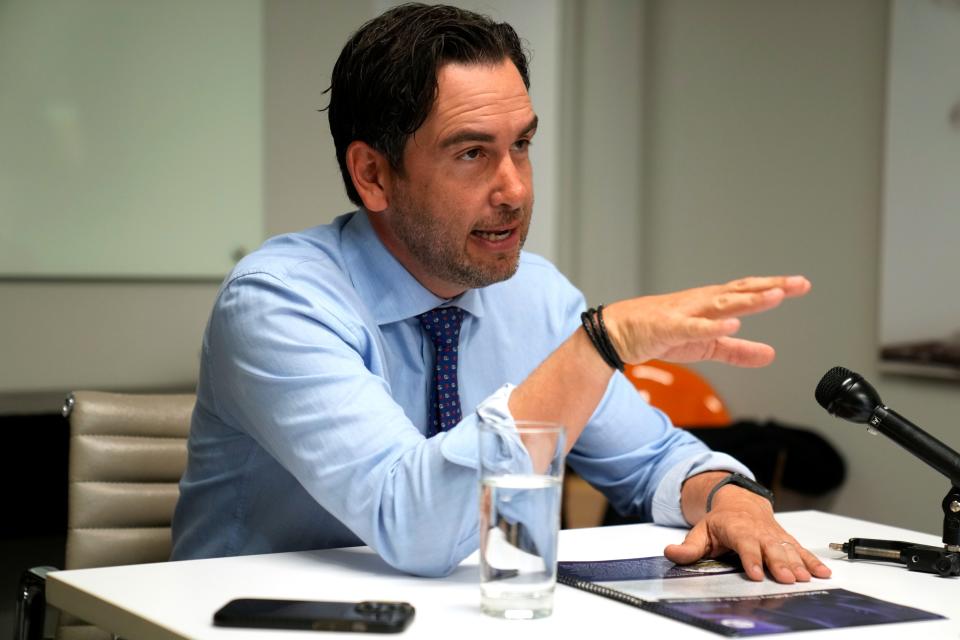
He outlined his accomplishments and a 14-page plan to improve the state’s transportation network Monday during a roundtable discussion with reporters.
The plan, which focuses on public transportation, includes ideas to fund NJ Transit, create a New Jersey version of congestion pricing, move PATH out of the purview of the Port Authority and improve the customer experience at the Motor Vehicle Commission.
Matthew Hale, an associate professor of political science and public affairs at Seton Hall University, said it was a good move for Fulop to be out in front with his ideas and policy priorities at this stage, especially with no known party contenders, though there are a few Democrats rumored to be considering entering the gubernatorial race.
“The goal is to try to get as many people in the various political machines to pay attention and ultimately support him,” Hale said. “It makes a lot of sense for him to try to put his policy ideas out there now, to try to win those dyed-in-the-wool party apparatchiks that really do care about the specifics of policy.”
Here’s a breakdown of Fulop’s ideas:
Congestion pricing
Fulop will likely set himself apart from many gubernatorial hopefuls with his support for congestion pricing, a new toll program New York is crafting to charge drivers entering Manhattan below 60th Street. Gov. Phil Murphy launched a lawsuit against the Federal Highway Administration last month for approving the plan, and most political figures in the state have voiced their opposition to the program.
“Congestion pricing has shown that it can be a good policy from an environmental standpoint and a congestion standpoint,” Fulop said. In fact, his response is to propose a form of congestion pricing in New Jersey.
“New Jersey should be applying the same sort of taxation on New York drivers coming in and dedicate those dollars towards some of the issues that I said here with regard to the Port Authority, specifically the PATH system,” Fulop said. “Everywhere where it’s possible, I think we should support taxing New York drivers coming in here.”
The idea was rebuffed by U.S. Rep. Josh Gottheimer, a Democrat outspoken against congestion pricing and thought to be considering a run for governor, who said it makes "zero sense."
"Fulop’s pro-Congestion Tax plan suggests that Jersey commuters should be tolled yet a third time when they come home from New York City," Gottheimer said in a statement. "We should be encouraging everyone to come to Jersey — not implementing our own Congestion Tax which will hurt our families, small businesses, tourism, and local economies."
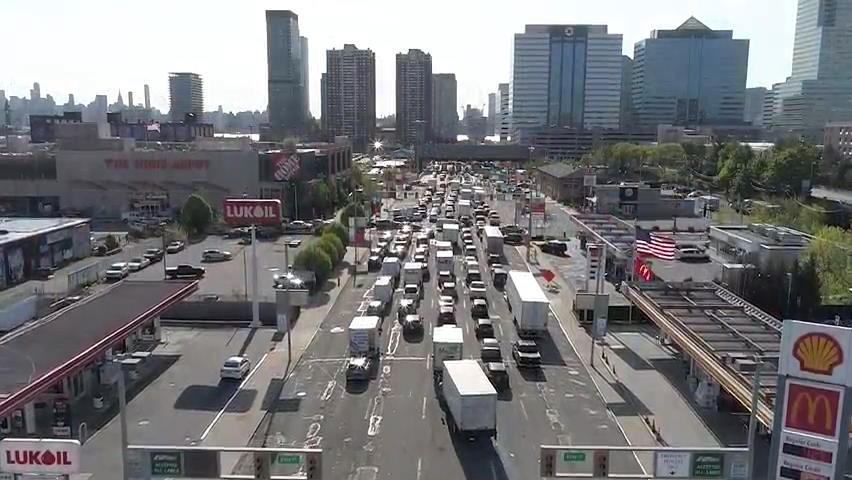
New York is currently weighing how to design its program, and specifically whether there should be credits or exemptions to the tolls. This is of critical importance to New Jersey drivers, who could receive credit for already paying tolls on the Hudson River crossings, including the George Washington Bridge, Holland Tunnel and Lincoln Tunnel — while drivers from New York currently have toll-free options.
Asked whether New Jersey drivers at those crossings should receive credits, Fulop said, “The short answer is no.”
“If you credit everybody, the wealthiest people with tolls that are used to offset mass transit … then it’s counterproductive to the whole concept of congestion pricing,” he said.
NJ Transit
When it comes to NJ Transit, the country’s largest statewide transit agency, Fulop's plan focuses on dedicating more money for the agency, expanding service and fixing up stations.
Among the biggest unsolved problems the agency faces is that it doesn’t have funding dedicated to it by law — a problem Fulop said he would tackle by reinstating the corporate business tax, which could generate an estimated $1 billion in revenue. NJ Transit is facing a deficit forecast to be about $1 billion in 2025-26.
The CBT is due to expire at the end of this year after Gov. Phil Murphy and the Legislature passed on an opportunity to extend it during this year’s budget negotiations.
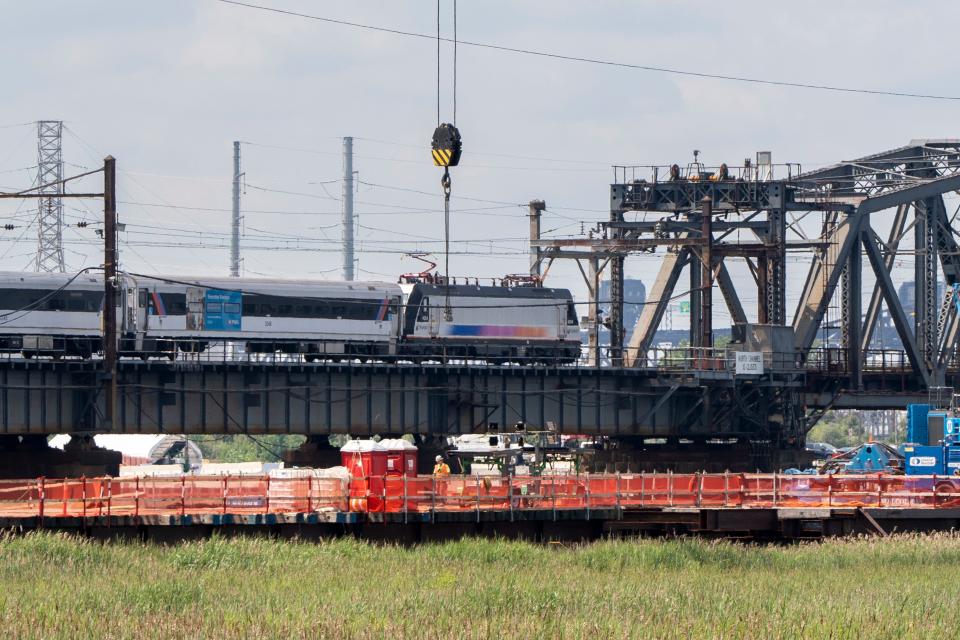
Asked how he would handle the political challenge of reviving the tax, Fulop said, “It clearly is an attainable goal, because it’s something that’s been before, and I think a new governor leaning into this as a priority, especially with the current status of NJ Transit, is something we can accomplish.”
Other streams of revenue he identified include selling off unused “orphan” properties owned by NJ Transit to real estate developers and using the money to make station improvements. Instead of having the New Jersey Turnpike Authority spend $10.6 billion on a controversial project to expand an 8.3 mile stretch of highway toward the Holland Tunnel and Bayonne, Fulop said, some of that money should be used to fund the expansion of light rail. Capital-to-operating transfers could also be phased out, he said.
“If better run and better invested in, and you have clear lines of dollars dedicated to it you, I think that you would see a more reliable train system,” Fulop said. “The reason that NJ Transit struggles is a lack of investment.”
Port Authority
Among the more eyebrow-raising and potentially challenging ideas Fulop proposed is to move the PATH train system to NJ Transit from the Port Authority, which has unique jurisdiction in both states so it can oversee a system that operates between the two.
Fulop claims the Port Authority doesn’t treat the PATH system as a priority because it’s a money-losing entity, like most transit systems in the country. Even though the bi-state agency recently invested $1 billion in improving signals and expanding capacity, Fulop said expansion efforts or restoring service are challenges for the system.
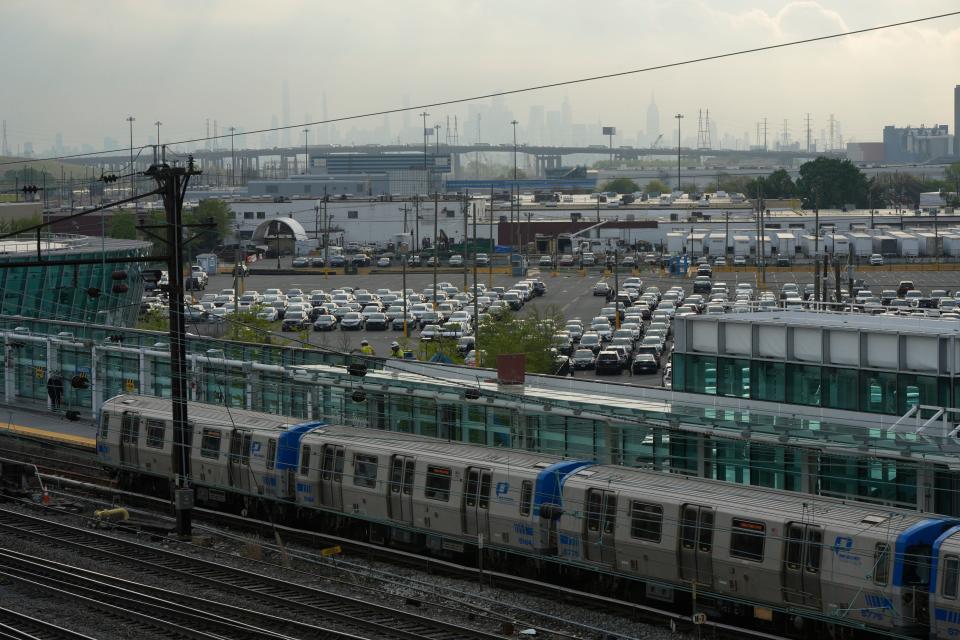
Overall, Fulop was complimentary of the work Kevin O’Toole has done at the Port Authority as chairman, but said he would want to reset the agency’s priorities with more involvement from Trenton.
“The chairman there today has done a great job. I think he’s been very, very effective in recalibrating the relationship between New York, largely because of his skill set,” Fulop said. “Communication from Trenton and involvement in priorities there is really important, and I think how the Port Authority fits in with the larger vision of transportation in New Jersey is important.”
Walking, biking, short trips
Fulop plans to bring his successes in microtransit and streetscape redesign to the rest of the state.
A ride-sharing service, called VIA, was launched in Jersey City three years ago to help those in transit deserts get short distances to public transportation, a program Fulop said he would launch as governor in the 10 densest cities in the state.
Expanding bike lanes and making streets more pedestrian-friendly are other key improvements that could use more statewide resources, he said. Adopting a statewide Vision Zero plan would be central to those improvements; that is the model used around the country to reinvent streetscapes to prevent pedestrian and cyclist deaths.
Jersey City had zero traffic-related fatalities last year thanks to its Vision Zero planning efforts, Fulop said. The state, meanwhile, has experienced 30-year highs in pedestrian and cyclist fatalities in recent years.
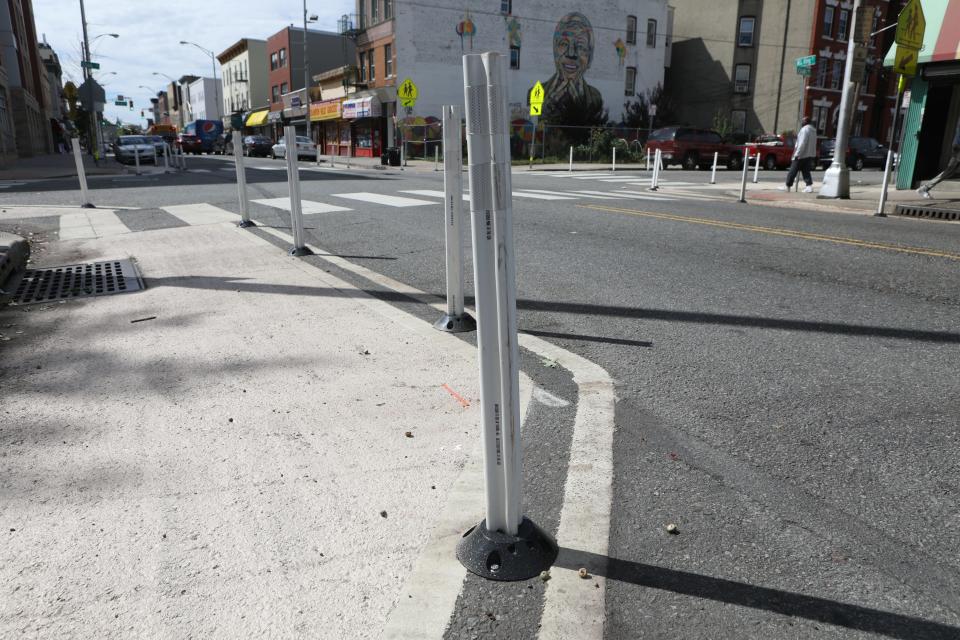
“How people move is changing with technology. That’s what drove us with the whole conversation around VIA, that a fixed route of a bus traveling with a quarter full doesn’t make a lot of sense from an environmental standpoint or cost difference, especially when the technology exists for you to have a more dynamic route based on where people are and where they’re going,” he said.
Motor Vehicle Commission
Improving the Motor Vehicle Commission customer experience is a key point in Fulop's plan for better operation of the much-despised agency, which became known for long lines and frequent closings during the peaks of COVID.
Requiring in-person transactions to take 30 minutes or less was among the central bullet points of his proposal for the MVC.
“When people go to Motor Vehicle to get their licenses renewed or basic service, it shouldn’t take their entire day and it shouldn’t entail them even missing work — I think that’s a frustration for everybody,” Fulop said. “The hours of operation there should reflect something that accommodates people who work a normal day.”
Expanding the number of MVC transactions that can be done online would also be critical to changing the customer experience there, he said.
This article originally appeared on NorthJersey.com: Jersey City Mayor Steven Fulop eyes NJ governor race

